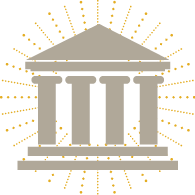 |
NEW ROLES FOR LIBRARIES AND LIBRARIANS |
| BY MICHAEL FOSMIRE |
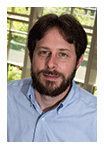 Purdue University recently hosted the 10th Design Thinking Research Symposium, a multidisciplinary international conference that brings together researchers who teach design, broadly defined. One of the truly novel aspects of this symposium is that the organizers collected a common dataset that all the participants analyzed and then presented their interpretation of the data. In this case, several hours of ‘design review’ videos were gathered from a variety of programs at Purdue: choreography, industrial design, mechanical engineering, EPICS and entrepreneurship. These led to very interesting conversations throughout the event, as everyone was familiar with each other’s data and could speak deeply about the situations described in a presentation. In such a way, everyone could appreciate the different lenses that can be applied to the same data, broadening their appreciation of alternative perspectives and, ultimately, how much information is encoded in the data. Furthermore, the conference attracted researchers from different disciplines who do design, so visual and performing arts, industrial design, architecture and engineering educators were able to appreciate the disciplinary differences and similarities of their approaches to design. This program really highlighted the power of sharing data, particularly across disciplines. Purdue University recently hosted the 10th Design Thinking Research Symposium, a multidisciplinary international conference that brings together researchers who teach design, broadly defined. One of the truly novel aspects of this symposium is that the organizers collected a common dataset that all the participants analyzed and then presented their interpretation of the data. In this case, several hours of ‘design review’ videos were gathered from a variety of programs at Purdue: choreography, industrial design, mechanical engineering, EPICS and entrepreneurship. These led to very interesting conversations throughout the event, as everyone was familiar with each other’s data and could speak deeply about the situations described in a presentation. In such a way, everyone could appreciate the different lenses that can be applied to the same data, broadening their appreciation of alternative perspectives and, ultimately, how much information is encoded in the data. Furthermore, the conference attracted researchers from different disciplines who do design, so visual and performing arts, industrial design, architecture and engineering educators were able to appreciate the disciplinary differences and similarities of their approaches to design. This program really highlighted the power of sharing data, particularly across disciplines.
So, how did the Libraries contribute to this experience?
Responding to a general call for interest, I attended an organizational meeting and rapidly was added to the organizing committee. I scoped out three areas that the Libraries could assist with pulling off this ambitious program.
Shared Data
This sounded like a perfect testbed for PURR, and so early on, we discussed how participants would be using the data and how different aspects of PURR could facilitate collaboration. The DTRS organizers posted design review video footage onto the PURR platform for researchers to use. In order to access the data, researchers had to sign a data-use agreement, indicating that they wouldn’t share identifiable information outside of the research environment. Participants were able to query the symposium organizers for additional information (e.g., syllabi for courses, indications of success of the teams) and supplementary information was disseminated within the PURR infrastructure for all to use. Once papers are published, links will be made back to PURR so readers can consult the original (anonymized) data.
Scholarly Communication
Naturally, if one is hosting a conference, Purdue e-Pubs can be an easy way to distribute the content in an open-access environment. So, hooking up the DTRS with Dave Scherer allowed us to create a landing page for the conference and a collection to host the proceedings. Since the DTRS tries to model a living community-driven experience, the organizers also are planning on publishing a book through the Purdue Press encapsulating participants’ learnings from the research process and the symposium experiences. To that end, authors will be encouraged to revise and augment their conference papers to incorporate feedback and new insights derived during the symposium.
Active Learning and Knowledge Transfer
As a culminating activity for the symposium, I co-facilitated a day long ‘research to practice’ workshop with Junaid Siddiqui and Robin Adams from the School of Engineering Education. Prior to the conference, we asked authors to try and make connections between their work and others. For example, during the peer review of proposals, they were asked how the reviewed work relates to their own. In their manuscript, they were also asked how their research could be put to practical use. All of this was to prime the pump to get participants to think about translating their research into the classroom. Using a collaborative inquiry model during the workshop, we encouraged participants to reflect on the presentations from the conference, their knowledge of the research literature, and then work in small groups to create actionable plans to either implement the best practices they found in their research, and/or developing new ‘teaching experiments’ to investigate questions raised in their inquiry. Overall, the participants really appreciated the ability to reflect and process all the information from the conference with other participants before heading back to their institutions. Many comments indicated that this processing step, particularly within a small group of peers, was extremely helpful to internalize what they had learned and get feedback and dialogue from the people giving the papers. The experience was an excellent example of the information integration aspect of lifelong learning, modeling best practices of making knowledge explicit and turning it into something actionable.
Overall, the symposium offered a unique learning environment and was an amazing experience developing a community of practice among like-minded individuals. And, getting involved in these activities is easier than it looks. If you respond to calls for interest and are willing to volunteer to do some work, I’ve found faculty are more than happy to include you in the process. |
 |
PURDUE MOVES – THE LIBRARIES AND PURDUE POLYTECHNIC |
BY AMY VAN EPPS |
The Purdue Polytechnic Institute (PPI) has a goal of no less than transforming education at Purdue, utilizing a student-centered and competency-based approach. Michael Fosmire and Amy Van Epps were named Faculty Fellows in the PPI and have been involved in planning the first semester learning experiences for the inaugural cohort of 33 students, as well as contributing to the design of a PPI-flavored four-year degree program.
In the first year, students participate in two learning experiences, a Seminar course and a Design Lab, each of which meet for 8 hours a week in the Discovery Learning Center. Students have several projects they can choose to work on, and, based on how they engage with their projects, they can demonstrate their competency in different areas corresponding to oral and written communication, teamwork and project management, among others, which are documented as badges within Purdue’s OpenPassport platform.
Information literacy is one such competency that the PPI program determined was important to offer first year students. As such Van Epps and Fosmire developed the content for a one-credit hour equivalent information literacy badge modeled on the University core curriculum requirements. Students can demonstrate mastery in information literacy by submitting work from either the Design or Seminar course that shows appropriate gathering, evaluation, use and documentation of information in the context of that project. In order to maintain information literacy alignment within the course, Van Epps has been active as an instructor in the Seminar course as well as serving as a faculty mentor for a group of students, helping them understand how these courses relate to their overall career path at and beyond Purdue and helping them develop personal learning plans to acquire the skills, abilities and attitudes they need to prepare them to achieve their career goals. |
 |
GIS DAY @ PURDUE 2014 |
BY NICOLE KONG |
 Purdue University will host its 7th GIS Day Celebration November 6-7. GIS Day is a global celebration of geospatial research and GIS. Purdue University Libraries is working with the GIS Day planning committee, which includes members from different departments, to organize this campus-wide event. GIS Day is a great opportunity to bring together the GIS community on campus, exchange research ideas, update recent development and invite external speakers to address topics the community are commonly interested in at Purdue. Purdue University will host its 7th GIS Day Celebration November 6-7. GIS Day is a global celebration of geospatial research and GIS. Purdue University Libraries is working with the GIS Day planning committee, which includes members from different departments, to organize this campus-wide event. GIS Day is a great opportunity to bring together the GIS community on campus, exchange research ideas, update recent development and invite external speakers to address topics the community are commonly interested in at Purdue.
This year’s GIS Day is featured as "GIS across Disciplines." The college day program will be held on Friday, November 7 from 9 a.m.-5 p.m. in STEW 214. This program will include invited talks, presentations, student lightning talks and a poster competition. These events are free and open to the public. The three modules we are planning include: GIS in Humanities and Social Science, GIS resources for everyone, and GIS Careers. In the GIS in Humanities and Social Science module, keynote speaker, Dr. David Bodenhamer, Executive Director of The Polis Center, Professor of History and Adjunct Professor of Informatics, IUPUI, will present on the emergence of spatial humanities. In the GIS resources module, Indiana Geographic Information Officer, Jim Sparks, and Executive Director of Indiana Geographic Information Council, Phil Worrall, will give the presentations about statewide GIS resources available for higher education. In the GIS career module, the career lunch panel presentation brings opportunities for students to discuss career development with potential employers and GIS professionals (RSVP is required).
The complete schedule for GIS Day college program is available at https://stemedhub.org/groups/purduegisday/gisday_2014_college_program.
In addition to the college program, we will host a high school GIS Day program at Purdue on November 6. This year, two high schools with about 60 students will join us for the event. Libraries is working with Earth, Atmospheric and Planetary Science Department, Discovery Learning Center, the Purdue Polytechnic Institute, Geographic Education Network at Indiana and ITAP in designing age-appropriate activities, to introduce GIS for high school students and teachers. If you are interested to be a volunteer for this program, please fill out the online volunteer form.
GIS Day is sponsored by the Office of the Provost, College of Liberal Arts, College of Agriculture, College of Science, College of Education, College of Technology, the Graduate School and Purdue University Libraries. |
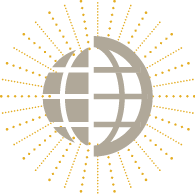 |
OPEN ACCESS WEEK @ PURDUE: MILESTONES AND IMPACT |
BY DAVID SCHERER |
 This has been a major year for open access initiatives and milestones at Purdue and Open Access week was the time to showcase them. Last week the Purdue University Libraries celebrated Open Access Week. This is the sixth year the Libraries has celebrated Open Access Week and the eighth year overall for the international event. Throughout the week the Libraries announced two major milestones made this year at Purdue in open access in two of our institutional repositories. Early this month, Purdue e-Pubs surpassed 8.0 million downloads and 40,000 objects, and PURR surpassed 100 published open access datasets. The Libraries also has brought focus on some of the ways that it tracks the global impact of Purdue scholarship and research through the Purdue e-Pubs readership activity map. This has been a major year for open access initiatives and milestones at Purdue and Open Access week was the time to showcase them. Last week the Purdue University Libraries celebrated Open Access Week. This is the sixth year the Libraries has celebrated Open Access Week and the eighth year overall for the international event. Throughout the week the Libraries announced two major milestones made this year at Purdue in open access in two of our institutional repositories. Early this month, Purdue e-Pubs surpassed 8.0 million downloads and 40,000 objects, and PURR surpassed 100 published open access datasets. The Libraries also has brought focus on some of the ways that it tracks the global impact of Purdue scholarship and research through the Purdue e-Pubs readership activity map.
Later this week the Libraries will finish its Open Access Week events with celebrating unique Purdue contributions to the movement. One of the ways the Libraries celebrates these location contributions is through its Leadership in Open Access award. The award is given in recognition of a faculty member or department that makes a major contribution towards open access on Purdue’s campus. This year the award is being given to the Department of Psychological Sciences, College of Human and Health Sciences.
At the end of last year John Fritch, the liaison librarian to Psychological Sciences, and I met with the department to discuss Purdue e-Pubs and open access. Over the past year the department has been working with the Purdue e-Pubs repository specialists and staff to deposit their publications (as allowed) into Purdue e-Pubs in order for these publications to be openly available to the world via the department’s publication series in the repository. Psychological Sciences was the first department at Purdue to take advantage of the new Purdue e-Pubs service model. After faculty supply us with their CV the repository specialists and staff will determine if the article can be openly shared, and deposit the approved copies on the faculty’s behalf. Since January of this year, the department has added 100 previously published works to the collection and have already been downloaded over 2,100 times!
The Leadership in Open Access award will be presented to Dr. Christopher Agnew, Professor and Head of Psychological Sciences on Friday, October 31. The award will be presented by Executive Vice President for Academic Affairs and Provost, Dr. Debasish Dutta in the Provost’s Office.
As we recognize the accomplishments of DPS it’s also a great time to tell other faculty and departments about these repository services. Please direct faculty and departments to our Open Access @ Purdue website to learn more about our services, or ask if they would like a short presentation at their next faculty department meeting. |
 |
LIBRARIES DISTINGUISHED LECTURE WITH ANDREW YANG |
|
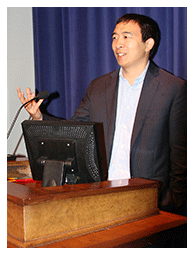 Andrew Yang, Founder and CEO of Venture for America, was the twelfth speaker in Purdue Libraries’ Distinguished Lecture Series on October 20. Yang greeted audience members as they entered Fowler Hall and later during his lecture called out to them by name to ask for their thoughts, opinions and ideas. He shared his failures and successes about starting up his own company and encouraged students to apply to the fellowship program. Andrew Yang, Founder and CEO of Venture for America, was the twelfth speaker in Purdue Libraries’ Distinguished Lecture Series on October 20. Yang greeted audience members as they entered Fowler Hall and later during his lecture called out to them by name to ask for their thoughts, opinions and ideas. He shared his failures and successes about starting up his own company and encouraged students to apply to the fellowship program.
The lecture was made possible with major funding from the Estate of Anna M. Akeley and was co-sponsored with Discovery Lecture Series, Discovery Park. |
 |
LIBRARIES SEMINAR WITH KIRK ENGLEHARDT |
|
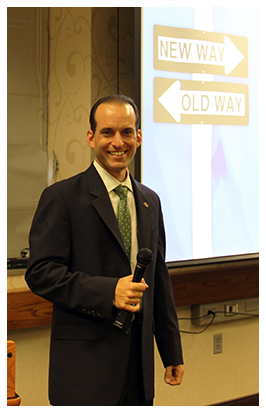 Purdue University Libraries Seminar Committee welcomed Kirk Englehardt, Director of Research Communications for the Georgia Institute of Technology, for a seminar on “A Science Communication Revolution: From Publish or Perish to Post or Perish.” Purdue University Libraries Seminar Committee welcomed Kirk Englehardt, Director of Research Communications for the Georgia Institute of Technology, for a seminar on “A Science Communication Revolution: From Publish or Perish to Post or Perish.”
His fast-paced presentation explored the changing science communication landscape and directly addressed both the benefits and risks researchers encounter when they begin engaging directly with the public online. It included real stories, drawn from interviews with prominent scientists, illustrating the personal impact becoming a ‘public academic’ has had on their career, reputation and future.
Englehardt also addressed the fears and misconceptions that cause many researchers to ‘think twice’ about public engagement, explored the pros and cons of blogging and using Twitter for outreach and shared actionable tips for those wanting to get started right away. |
 |
PARRISH LIBRARY CASE COMPETITION WINNERS |
BY ILANA STONEBRAKER |
Eight teams competed in the first Parrish Library Case Competition. All groups showed exemplary case analysis, problem solving and information literacy. Three teams advance to the final round to complete for first, second and third place.
First Place: Team K5 — Bumsun Ryu, Saya Lee, Jungwon Pyo, Eunwon Kim, Brian Byoungguk An
Second Place: Fire Breathing Rubber Duckies — Tony Geng, Xuanyu Chen, Derek Williams, Keshav Bhrandari (Derek Williams is a Hicks Repository student employee).
Third Place: Boiler Up — Nan Meng, Alex Hardenbrook, Leign Avery, Joseph Vandermus
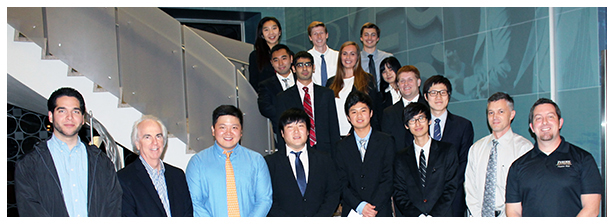
Photo provided by Patrick Whalen.
|
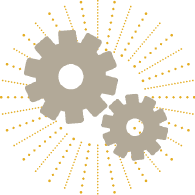 |
LIBRARIES NEW STAFF |
|
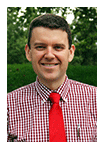 Dave Zwicky Dave Zwicky
Chemical Information Specialist
I am thrilled to join Purdue Libraries as Chemical Information Specialist and Assistant Professor of Library Science in the Physical Science, Engineering, Technology division, serving as the liaison for Chemistry, Chemical Engineering and Materials Engineering.
I’m originally from Fond du Lac, Wisconsin, deep in the heart of cheese country. Growing up, I planned on being a chemical engineer. However, after getting my BS from the University of Wisconsin and my MS from the University of Illinois, I realized I wanted to change directions. Looking for something that complemented my engineering background, I found librarianship. I went back to the University of Wisconsin for my MLS, and it’s the best decision I’ve ever made. I’ve spent the last six years as an engineering and textiles librarian at North Carolina State University, where I taught, built collections and worked on the transition of a small branch library into a new library facility. I’m excited to be at Purdue, and I look forward to working with our faculty, staff, and students.
On a personal note, I am pleased to be back in the Midwest (and in the Big Ten — however many members it may currently have) and I’m looking forward to experiencing real winter again. My hobbies include collecting comic books, rooting for the Green Bay Packers and tinkering with my Linux computer.
My office is currently in 310 Wetherill, down the hall from the M.G. Mellon Library of Chemistry, and I can be contacted by e-mail at dzwicky@purdue.edu or by phone at (765) 496-7279. |
 |
MAKING WAY FOR THE ALC |
| |
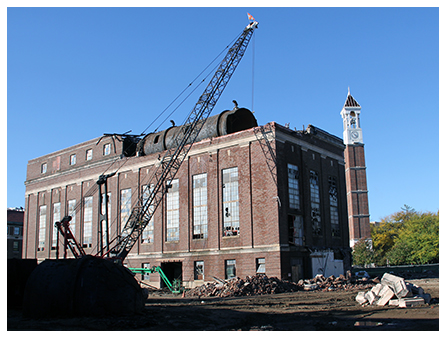
Demolition continues for construction of the Active Learning Center.
An early morning fire broke out at the demolition site of the old Heating and Power Plant-North on October 22. The fire was contained mostly to the roof area of the building and was quickly extinguished. Firefighters believed a coating from a water tank that was removed from the roof may have started the fire. There was no damage to nearby facilities and demolition of the building continues. |
|
|

 Purdue University recently hosted the 10th Design Thinking Research Symposium, a multidisciplinary international conference that brings together researchers who teach design, broadly defined. One of the truly novel aspects of this symposium is that the organizers collected a common dataset that all the participants analyzed and then presented their interpretation of the data. In this case, several hours of ‘design review’ videos were gathered from a variety of programs at Purdue: choreography, industrial design, mechanical engineering, EPICS and entrepreneurship. These led to very interesting conversations throughout the event, as everyone was familiar with each other’s data and could speak deeply about the situations described in a presentation. In such a way, everyone could appreciate the different lenses that can be applied to the same data, broadening their appreciation of alternative perspectives and, ultimately, how much information is encoded in the data. Furthermore, the conference attracted researchers from different disciplines who do design, so visual and performing arts, industrial design, architecture and engineering educators were able to appreciate the disciplinary differences and similarities of their approaches to design. This program really highlighted the power of sharing data, particularly across disciplines.
Purdue University recently hosted the 10th Design Thinking Research Symposium, a multidisciplinary international conference that brings together researchers who teach design, broadly defined. One of the truly novel aspects of this symposium is that the organizers collected a common dataset that all the participants analyzed and then presented their interpretation of the data. In this case, several hours of ‘design review’ videos were gathered from a variety of programs at Purdue: choreography, industrial design, mechanical engineering, EPICS and entrepreneurship. These led to very interesting conversations throughout the event, as everyone was familiar with each other’s data and could speak deeply about the situations described in a presentation. In such a way, everyone could appreciate the different lenses that can be applied to the same data, broadening their appreciation of alternative perspectives and, ultimately, how much information is encoded in the data. Furthermore, the conference attracted researchers from different disciplines who do design, so visual and performing arts, industrial design, architecture and engineering educators were able to appreciate the disciplinary differences and similarities of their approaches to design. This program really highlighted the power of sharing data, particularly across disciplines. Purdue University will host its 7th GIS Day Celebration November 6-7. GIS Day is a global celebration of geospatial research and GIS. Purdue University Libraries is working with the GIS Day planning committee, which includes members from different departments, to organize this campus-wide event. GIS Day is a great opportunity to bring together the GIS community on campus, exchange research ideas, update recent development and invite external speakers to address topics the community are commonly interested in at Purdue.
Purdue University will host its 7th GIS Day Celebration November 6-7. GIS Day is a global celebration of geospatial research and GIS. Purdue University Libraries is working with the GIS Day planning committee, which includes members from different departments, to organize this campus-wide event. GIS Day is a great opportunity to bring together the GIS community on campus, exchange research ideas, update recent development and invite external speakers to address topics the community are commonly interested in at Purdue. This has been a major year for open access initiatives and milestones at Purdue and Open Access week was the time to showcase them. Last week the Purdue University Libraries celebrated Open Access Week. This is the sixth year the Libraries has celebrated Open Access Week and the eighth year overall for the international event. Throughout the week the Libraries announced two major milestones made this year at Purdue in open access in two of our institutional repositories. Early this month, Purdue e-Pubs surpassed
This has been a major year for open access initiatives and milestones at Purdue and Open Access week was the time to showcase them. Last week the Purdue University Libraries celebrated Open Access Week. This is the sixth year the Libraries has celebrated Open Access Week and the eighth year overall for the international event. Throughout the week the Libraries announced two major milestones made this year at Purdue in open access in two of our institutional repositories. Early this month, Purdue e-Pubs surpassed  Andrew Yang, Founder and CEO of Venture for America, was the twelfth speaker in Purdue Libraries’ Distinguished Lecture Series on October 20. Yang greeted audience members as they entered Fowler Hall and later during his lecture called out to them by name to ask for their thoughts, opinions and ideas. He shared his failures and successes about starting up his own company and encouraged students to apply to the fellowship program.
Andrew Yang, Founder and CEO of Venture for America, was the twelfth speaker in Purdue Libraries’ Distinguished Lecture Series on October 20. Yang greeted audience members as they entered Fowler Hall and later during his lecture called out to them by name to ask for their thoughts, opinions and ideas. He shared his failures and successes about starting up his own company and encouraged students to apply to the fellowship program. Purdue University Libraries Seminar Committee welcomed Kirk Englehardt, Director of Research Communications for the Georgia Institute of Technology, for a seminar on “A Science Communication Revolution: From Publish or Perish to Post or Perish.”
Purdue University Libraries Seminar Committee welcomed Kirk Englehardt, Director of Research Communications for the Georgia Institute of Technology, for a seminar on “A Science Communication Revolution: From Publish or Perish to Post or Perish.”
 Dave Zwicky
Dave Zwicky




